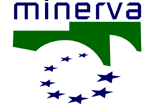| About Minerva | ||
| Structure | ||
| NPP | ||
| Good practices | ||
| Competence centres | ||
| Guidelines | ||
| Enlargement | ||
| Events | ||
| References | ||
| Publications | ||
Path: Home | Structure | Working Groups | WP2
Coordinator:University of Helsinki (FL) ObjectivesThis group (corresponding to work package WP 2) aims to assure exchange of compatible information between Member States on programmes and policies and to give visibility to national activities in order to exchange similar experiences and skills. An important objective is to promote the adoption of a benchmarking framework as a key tool for co-ordinating and harmonising national activities as well as to develop measures to show progress and improvement. The benchmarking framework, together with the good practices, shall be an ongoing process starting with Minerva. Building a benchmarking framework for digitisation within an agreed European common platform with recommendations and guidelines about digitisation, metadata, long-term accessibility and preservation. Benefits for the participants on all levels should be taken into account from the start. Ministry, national and institutional aspects as well as competence in different fields are important issues. Cooperation with the WPs concerning good practices and Competence Centres, discovery of digitised content and multilingualism issues, user needs, website quality and the former eEurope benchmarking workgroup is essential for content expertise of the benchmarking questionnaire and the testing of the framework. Focus has to be on pull factors and not on push factors Benchmarking, best practices, guidelines, standards, benchmarking - are activities that form a wheel which has to be rolling on by its own force. The structure of the public (state) administration differs from many other countries in Europe. Ministries are relatively small and normally only handling matters of general nature, not single cases. Central agencies are independent and responsible for the practical work in public (state) administration. Description of workThe work starts with defining a baseline profile for programmes and policies, based on existing questionnaires and benchmark exercises already set-up by different Member States and by the European Commission. As a next step this WP will identify a first set of qualitative and quantitative criteria taking in respect interoperability, multilingualism, availability, and accessibility to the final user. A model for a benchmarking framework will then be defined and refined, and proposed for agreement and adoption. A set of core indicators for benchmarking digitisation in Europe will be identified and developed, and methodologies defined for collecting data from Member States. WP2 also needs to support the creation of an infrastructure to co-ordinate future benchmarking activities. Member States will be provided with data about the baseline profile which are meant to be put on their national Web sites. The final aim is the development of recommendations to promote the application of a common benchmarking framework at European level. Milestones and expected resultRecommendations (starting from month 6) A baseline profile of programmes and policies First set of qualitative and quantitative criteria Model of benchmarking framework Set of core indicators for benchmarking Information and data to be put on national web sites Routines and mechanisms to assure future mounting and continuous updating of data on national web sites Web site and communication tools for the working group Guidelines Organisation of five meetings of the working group. Corner stones of the benchmarking frameworkWork already undertaken by the eEurope experts workgroup for benchmarking digitisation of cultural and scientific content. Needs of memory organisations, Member States and other relevant actors (both bottom up and top down approach). Expected resultsCompatible information on activities in Member States and other countries involved available on the Web. Development of a common benchmarking framework: methodology and indicators. Promoting coordination of digitisation policies between Member States and other participating countries, and at a European level. |
|
||||||||||||||||
|
Copyright Minerva Project 2003-04, last revision 2003-08-29,
edited by Minerva
Editorial Board. URL: www.minervaeurope.org/structure/workinggroups/benchmarking.htm |
 |

